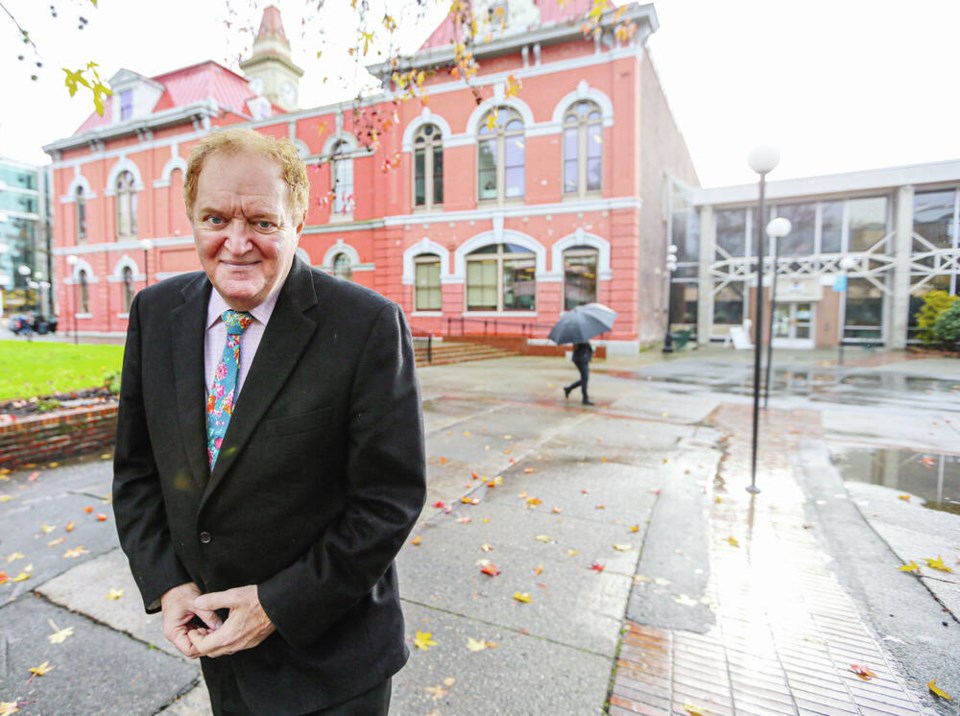Victoria Coun. Stephen Andrew says he plans to run for mayor in next October’s municipal election.
Andrew, who won his seat in a byelection a year ago, has positioned himself as a counterbalance to left-leaning councillors, and says public safety and housing are the two major issues facing the city.
“There’s a criminal element that has come to town that is preying upon those that are vulnerable, those that are either housed in a rough situation, or have addictions or mental health [problems], and we need to protect them,” Andrew said in an interview.
“Victoria didn’t use to be a city that was like this. It has grown into, I think, a city that is known for issues now. It’s become part of that image. People talk about going down Pandora and they equate it to [Vancouver’s] Downtown Eastside.”
Andrew said while he doesn’t necessarily agree with that comparison, he believes Victoria is bearing more than its fair share of social disorder associated with homelessness and addiction.
He said concentrating outreach services and supportive housing in Victoria has been problematic, and, as mayor, he would advocate for other municipalities and the province to step up.
Mayor Lisa Helps does not intend to seek a third term as Victoria mayor
For Andrew, the 2022 municipal election will mark the former television reporter’s fourth time running for council and his second mayoral campaign. He ran unsuccessfully for mayor in 2014, coming fourth with just under 2,400 votes, and he narrowly missed winning a council seat in the 2018 general election.
Last December, he won a seat on council, taking nearly twice as many votes as Together Victoria candidate Stefanie Hardman in a byelection where 17.5% of registered voters cast a vote, less than half the turnout in recent general elections.
The byelection was triggered by the resignation of Laurel Collins, who stepped down after becoming Victoria’s federal member of Parliament. Collins was one of three Together Victoria candidates elected in 2018, along with Sharmarke Dubow and Sarah Potts.
Andrew said he believes he can be a unifying voice as mayor, while acknowledging his recent public criticism of a fellow councillor would have been better handled privately than on social media.
Andrew took to Twitter to accuse Potts of voting earlier this year to eliminate all Victoria police salaries, before correcting his statement to reflect the voting record, which showed Potts voted against approving a $747,000 salary item in VicPD’s 2021 budget.
Potts went on to vote in favour of the final budget.
“It was frustration. And it shouldn’t have been said. It shouldn’t have been said. It should be behind closed doors, and I think you’ll find, definitely, that has been my lesson learned,” he said.
Andrew came under fire in the spring for saying on Twitter that he did not believe rape culture exists in Victoria, in the wake of sexual-assault allegations against three real estate agents in the city. The since-deleted tweet sparked anger, prompting Andrew to apologize and retract his comment, calling his words, “clumsy and … dismissive.”
Andrew said he was not familiar with the term “rape culture,” which refers to the idea that social attitudes have the effect of normalizing or trivializing sexual assault, and when he realized the pain he had caused, he apologized.
“I never try to present myself as perfect. And at least when I step in something or make a mistake, I will acknowledge it and apologize. I don’t see that around the table all the time,” Andrew said.
Other councillors have not yet announced an intention to run for mayor. Coun. Marianne Alto, first elected in a 2010 byelection, said she wants to stay on council, but has not decided whether that means running for mayor or seeking reelection as a councillor.
Councillors Geoff Young and Potts say they have no plans to run for mayor. Other councillors have said they are still focused on the current term and have not decided on plans for the next election.
On a left-leaning council in a city that leans the same way, Andrew has positioned himself as representing a portion of Victoria residents who feel disenfranchised and see things such as bike lanes, camping in parks and criticism of police as problematic, said David Black, an associate professor in the school of communication and culture at Royal Roads University.
“I think that his role is a kind of controversialist, or someone who may see himself as a truth-teller, or someone who sort of speaks truth to power, if you will. Or, on the other side, someone who is needlessly provocative and maybe intemperate, and I think that was true of the rape-culture comment,” Black said.
“Part of it is kind of how you succeed in municipal politics is by courting controversy. It’s not the only way to win, and clearly other candidates have made their way to the mayoral seat or to council, you know, through quieter means.”



